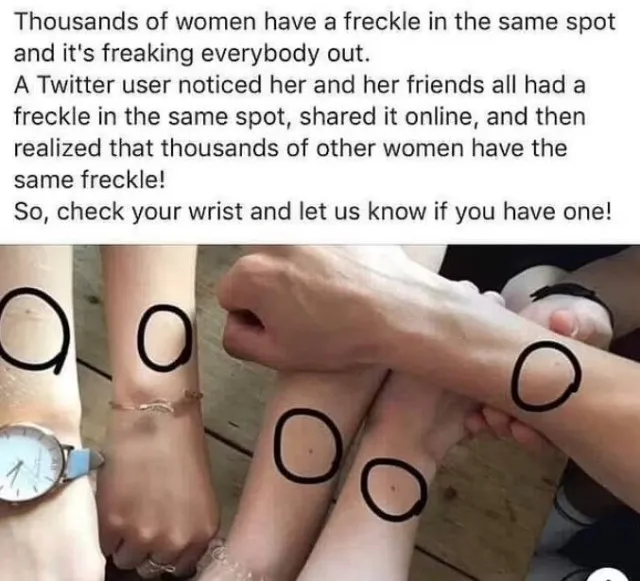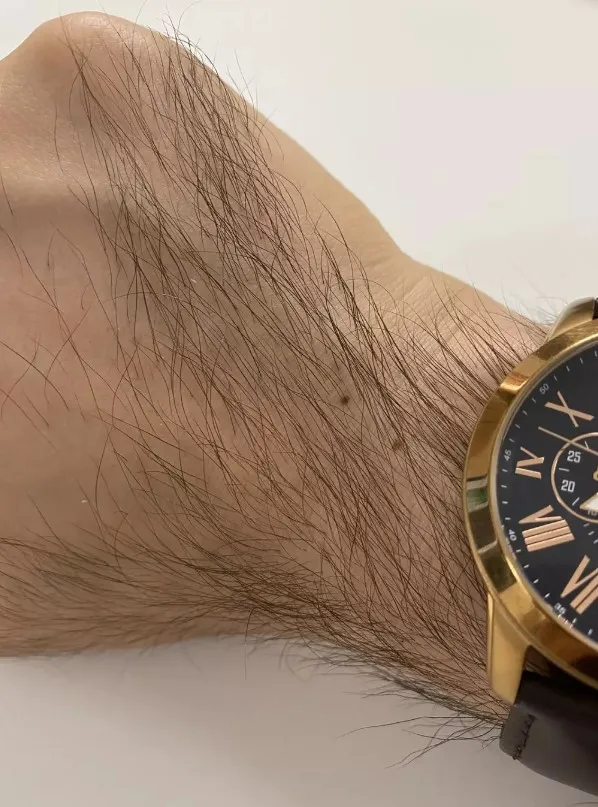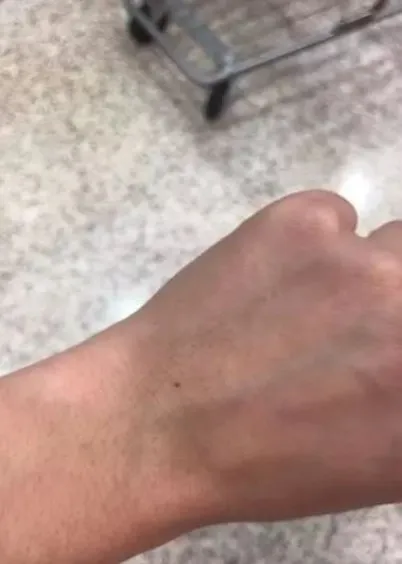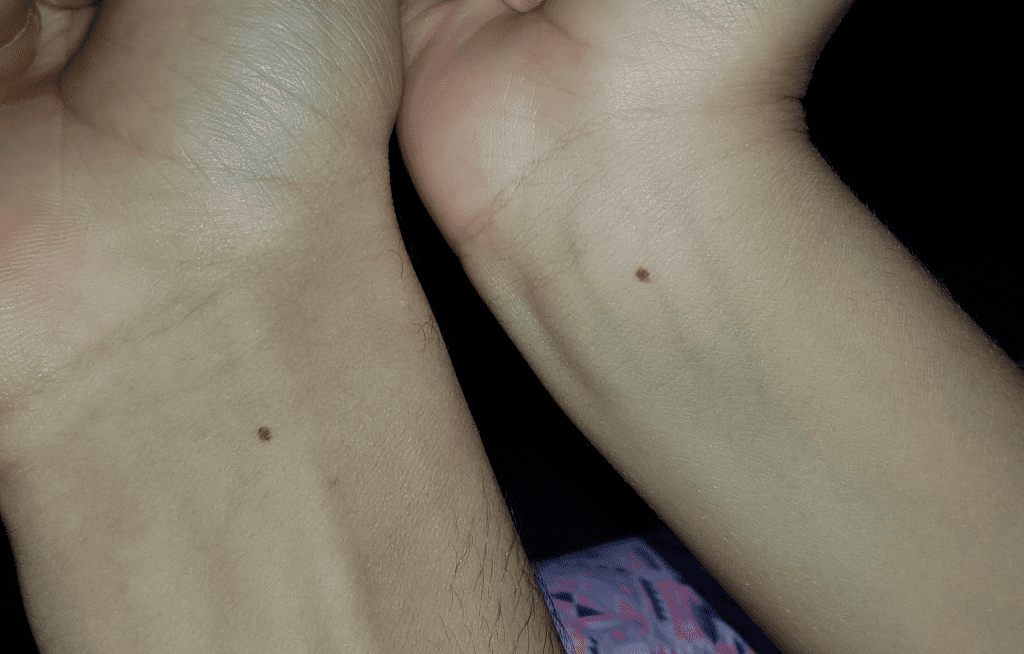Have you ever glanced at the back of your wrist and noticed a distinct freckle right where your hand meets your arm? If so, you’re not alone. Many people have reported seeing an identical freckle in the same spot, leading to a curious conversation online about this widespread phenomenon. It raises an interesting question: why do so many people have a freckle in the exact same location?

This mysterious occurrence has sparked conversations across social media, with many users baffled by their matching freckles. In this article, we’ll dive into the reasons why this might be happening, exploring insights from dermatologists and discussing the science behind freckles and skin pigmentation.
The Social Media Buzz: An Identical Freckle Discovery
It all started when a social media user, @MyGedagtes, posted a now-viral image showing identical freckles on several people’s wrists. The caption read, “Apparently all women have a freckle in the same place on their arm. I just checked mine and I have it. Let me know ladies if you have.”
To the amazement of many, countless people started checking their wrists and found the same freckle in the same spot. The comments section lit up with individuals sharing their surprise, with responses ranging from, “I have so many freckles, but yes, I see this one,” to, “Both of my arms have that exact same freckle!”
So, what’s going on here? Why do so many of us share this peculiar feature?
Why Are Freckles So Common on the Wrist?
Dermatologist Dr. Joyce Park explains that freckles are primarily the result of increased pigmentation caused by exposure to ultraviolet (UV) radiation from the sun. The forearms, wrists, and backs of the hands are particularly prone to sun exposure because they’re often uncovered, even when the rest of our bodies are protected by clothing.
“When you’re driving, for example, the side of your wrist and hand is often exposed to direct sunlight,” Dr. Park notes. “Even if you’re wearing sleeves, the hands and wrists are typically exposed, making them prime locations for freckles to develop.”
Additionally, many people neglect to apply sunscreen to their wrists and hands, leaving them vulnerable to the sun’s damaging rays. Over time, repeated exposure leads to the development of freckles in these areas.
The Role of UV Radiation in Freckle Formation
Freckles are clusters of melanin, the pigment responsible for the color of our skin. When exposed to sunlight, the skin produces more melanin as a protective mechanism. This is why freckles tend to darken or become more prominent after time spent in the sun.

The wrist, being frequently exposed to sunlight—whether you’re walking outside, driving, or even sitting by a sunny window—is a hot spot for freckle formation. The UV radiation triggers the skin to produce extra melanin, which accumulates and forms the familiar brown spots we know as freckles.
So, if you’ve ever noticed that your wrist freckle seems darker during the summer months, UV exposure is the likely culprit.
Freckles vs. Moles: Understanding the Difference
While many people refer to these spots as freckles, some dermatologists suggest that what people are noticing could actually be harmless moles or beauty marks. Dermatologist Dr. Joshua Zeichner explains that moles are small brown spots caused by the overgrowth of pigment-producing cells called melanocytes.
“Most people have at least one mole on their arms,” Dr. Zeichner says. “What we’re seeing in these viral photos are likely moles or beauty marks rather than freckles. These spots are harmless and very common.”
The distinction between freckles and moles is subtle but important. Freckles are caused by an increase in melanin production, often triggered by sunlight. Moles, on the other hand, are clusters of pigment cells that form a spot, typically present from birth or developed during childhood. Unlike freckles, moles can appear without direct UV exposure and may remain unchanged over time.

Regardless of whether these spots are freckles or moles, both experts agree that they’re harmless. However, it’s always important to monitor any changes in size, shape, or color, as sudden changes could indicate a potential skin issue that requires medical attention.
The Science Behind the Freckle Phenomenon
So why do so many people have freckles or moles in the exact same spot? The answer likely lies in the biology of skin exposure. The back of the wrist and hands are among the most commonly exposed areas of skin, especially when driving, walking outdoors, or engaging in daily activities.
Because of this frequent exposure to UV rays, these areas are more likely to develop sun-induced pigmentation, leading to freckles. Additionally, moles are often found on the arms and wrists, making it likely that people who check this area might notice the same small, harmless mark.
Ultimately, this phenomenon is not so much a mystery as it is a result of common environmental factors and human anatomy. The location of the freckle or mole is simply a coincidence of frequent sun exposure and the natural tendency of the skin to develop pigmentation in response to UV radiation.
The Importance of Skin Care and Monitoring Changes

While the shared freckle phenomenon may seem fun and intriguing, both Dr. Park and Dr. Zeichner emphasize the importance of taking care of your skin.
Sunscreen is your best defense against UV radiation and can help prevent freckles, moles, and other signs of sun damage from forming. Make it a habit to apply sunscreen not just to your face but also to your hands, wrists, and other exposed areas every day, regardless of the season.
It’s also crucial to regularly check your skin for any changes in existing freckles, moles, or other marks. If you notice anything unusual—such as a spot that changes color, grows in size, or becomes raised—it’s important to consult a dermatologist. Skin cancer can sometimes develop from moles, so keeping an eye on any changes is key to early detection.
Conclusion: Embracing the Freckle Connection
The discovery of matching freckles on the wrists of so many people is an interesting reminder of how our bodies respond to the environment around us. Whether you call it a freckle or a beauty mark, these small spots are a testament to the time we spend outdoors and the impact the sun has on our skin.
So, the next time you spot your “freckle buddy,” take a moment to appreciate the connection. And remember, while it’s fun to compare these tiny marks, caring for your skin through regular monitoring and sun protection is what truly matters.


